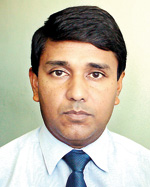News
World Brain Day focuses on seizures
It is to jog the collective memory of Sri Lankans on the importance of that wonder organ, the brain, that many an activity will be undertaken to celebrate the day dedicated to it across the world. World Brain Day with its focus on ‘Epilepsy…..is more than Seizures’ declared by the World Federation of Neurology on Wednesday (July 22) will see several events taking place in Sri Lanka.

ASN President: Dr. Sudath Gunasekera
Explaining that in May, this year, the 68th World Health Assembly approved calling on the World Health Organization (WHO) to continue to address the global burden of epilepsy, the Association of Srilankan Neurologists (ASN) President Dr. Sudath Gunasekera points out that worldwide this is the “most common chronic serious disease” of the brain. It affects 50 million people worldwide and in Sri Lanka, there are an estimated 200,000 patients with epilepsy. (The ASN is the academic body of neurophysicians in Sri Lanka.)
On why epilepsy has become the focus this year, he says there is lack of awareness as well as many misconceptions about it. There are also enormous psychosocial consequences for many who suffer from epilepsy which also brings about stigma. While epilepsy mostly affects children, no age is spared, says Dr. Gunasekera who is the first Consultant Neurophysiologist in the country. The onset of epilepsy is usually in childhood and if not treated properly could carry on into adulthood.
Stressing that epilepsy is easily treatable with inexpensive and effective medications, he points out that there are not only good drugs but also newer drugs. Seventy percent of epilepsy patients can be cured and lead normal lives with simple medications taken over a period of time.
In the balance 30%, epilepsy can be controlled with multi-drug treatment and in case there is no positive response, other methods such as surgery can be used effectively. “The outcome is good with a full cure when surgery is performed in a minority of carefully selected patients,” he says.
But, laments Dr. Gunasekera, some patients do not seek treatment or delay seeking treatment. This is why the ASN is conducting numerous awareness campaigns through newspapers, radio and television as well as a poster campaign to spread the message that epilepsy is treatable and curable.
Meanwhile, along with epilepsy, the ASN is also keeping health workers informed, through continuous medical education about the broad neurology updates. ”This is vital in view of the epidemic of non-communicable diseases which are assailing us and also the ageing population that the country is facing due to longevity promoted by a good health system. The ‘side-effects’ of such longevity though are an increase in neurological diseases such as stroke, dementia and Parkinson’s disease.
This year’s regional meeting of the ASN, in collaboration with the Colombo North Clinical Society, is scheduled to be held on July 23 at the North Colombo (Ragama) Teaching Hospital. Earlier regional meetings have been held in Karapitiya and Polonnaruwa.
| What is epilepsy? It is a brain disease characterized by recurrent seizures, which are due to brief disturbances in the electrical functions of the brain. The causes of epilepsy include brain damage from prenatal or perinatal causes, defects in brain development, genetic basis, neurological infections, head injuries, brain tumours, stroke and also unknown causes in many instances. While epilepsy is not contagious, the type of seizures depends on which area of the brain is involved. A person having a seizure may experience an alteration in behaviour, consciousness, movement, perception and/or sensation. Seizures could either be ‘generalized’ or ‘focal’. In generalized seizures, which could be convulsive or non-convulsive, abnormal electrical activity occurs throughout the whole brain or both hemispheres and alters awareness. Focal seizures start in one place – seizure focus – in the brain. They are discreetly localised at the beginning and may remain so or get diffused widely. These seizures may or may not alter awareness. For each seizure type, onset is consistent from one seizure to another, with preferential patterns of spread. | |

